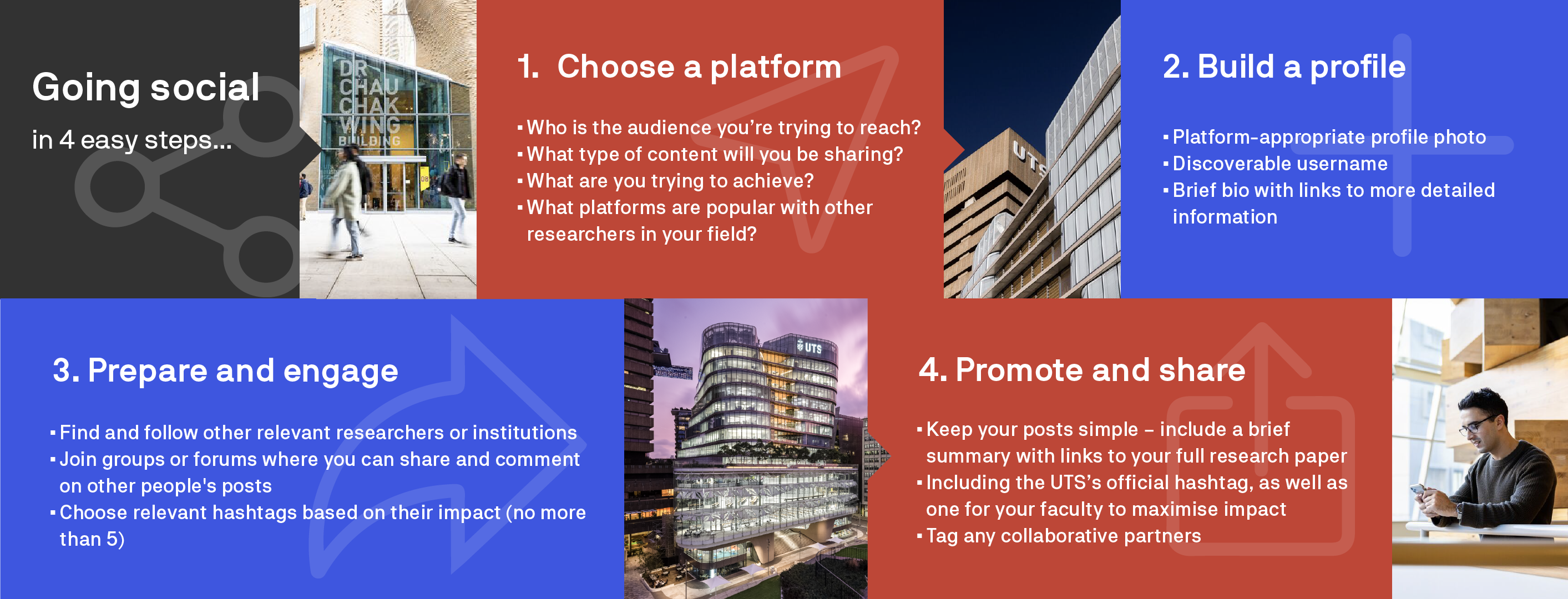Are you looking to use social media and don’t know where to start? Do you want to learn more about leveraging social media to promote your research and build engagement?
Going social

UTS’s Marketing and Communication Unit has recently developed a new training course titled Social Media and Research to demonstrate the ways social media can benefit researchers.
In today’s digital landscape, social media is a powerful tool for sharing and discussing research ideas and results.
In the United States, the Pew Research Centre has found that digital sources have become an important part of Americans’ news diets – with social media playing a crucial role, particularly for younger adults.
Overall, just over half of U.S. adults (54%) say they at least sometimes get news from social media, up slightly compared with the last few years.
Facebook and YouTube outpace all other social media sites as places where Americans regularly get news. About a third of U.S. adults say they regularly get news on each of these two sites. And 48% of TikTok users ages 18 to 29 use Tik Tok to keep up with news and political issues.
Smaller shares of Americans regularly get news on Instagram (20%), TikTok (17%) or X, formerly known as Twitter (12%).
And even fewer get news on several other sites, including Reddit (8%), Nextdoor (5%), Snapchat (5%), WhatsApp (5%), LinkedIn (4%), Truth Social (3%) and Rumble (2%).
Whether you're looking to increase visibility, build your network, or share your research with a broader audience, this module is a great way to connect with like-minded individuals and industry professionals, to showcase your expertise and even find more research funding.
In Australia, the University of Canberra’s Digital News Report: Australia 2024 shows that half of Australians (49%) use social media to access news, marking a 4 percentage point increase since last year.
One quarter now rely on it as their main source of news, particularly Facebook. Young people and women use it the most, and nearly two-thirds of Gen Z (60%) rely on social media as their main news source, which is a significant increase of 17 percentage points in the past year.
With this in mind, social media can significantly enhance your ability to engage with broader audiences, showcase your work and create greater impact.
Senior Social Media Advisor Jess Lo said, “Whether you're looking to increase visibility, build your network, or share your research with a broader audience, this module is a great way to connect with like-minded individuals and industry professionals, to showcase your expertise and even find more research funding.”
The online course will equip you with three key skills to help you leverage social media for research, the ability to:
- Identify the right social media platforms for your audience and research goals and learn the key elements that make posts resonate.
- Create engaging posts that follow UTS guidelines, using strategies like hashtags, appropriate tone and accessible content.
- Foster and expand your networks to boost community engagement and collaboration, while tracking growth and engagement.
Amplify your research
In this course, you will hear from some of our most experienced UTS researchers about how they’re using social media for impact and engagement.
Benefits they report include:
- increased citations
- broader audiences
- connections with decision makers
- crowdfunding and crowdsourcing
- controlling your message and determining your reach
- new research collaborations and grant opportunities
- deeper community engagement.
Going social in 4 easy steps

Follow these steps to boost your professional presence and make your research more impactful:
- Choose a platform: Who is the audience you're trying to reach? What type of content will you be sharing? What are you trying to achieve? What platforms are popular with other researchers in your field?
- Build a profile: Prepare a platform-appropriate profile photo, a discoverable username and a brief bio with links to more detailed information.
- Engage: Find and follow other relevant researchers or institutions. Join groups or forums where you can share and comment on other people's posts. Choose and use relevant hashtags based on their impact (no more than 5).
- Promote and share: Keep your posts simple - include a brief summary with links to your full research paper, including the UTS's official hashtag as well as one for your faculty to maximise impact. Tag any collaborative partners.
Enrol in the Social Media and Research course
“By the end of this course, you'll be able to identify the best platforms for your audience,
create engaging content with best practice in mind and start building an engaging online community around your research,” Jess said.
Whether you want to use LinkedIn, Tik Tok, Instagram or X to amplify your research- this course will show you how to build your academic brand, engage social media communities, try your hand at AI-assisted content creation and more.